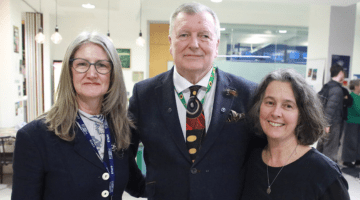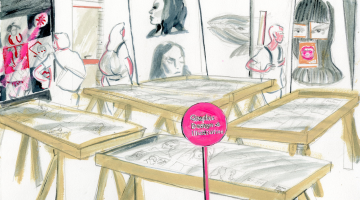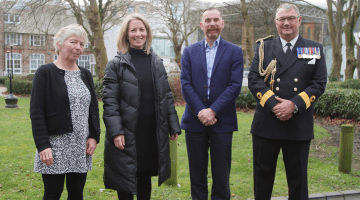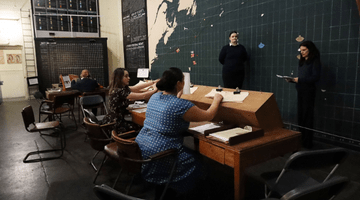Course modules
What you will study on this degree
Further guidance on modules
Modules are designated core or optional in accordance with professional body requirements, as applicable, and LJMU’s Academic Framework Regulations. Whilst you are required to study core modules, optional modules provide you with an element of choice. Their availability may vary and will be subject to meeting minimum student numbers.
Where changes to modules are necessary these will be communicated as appropriate.
Core modules
Facilitation: Presence, Play and Purpose
30 credits
30 credits
This module focuses on the fundamentals of drama facilitation. Students explore the constituent parts of the drama workshop and develop individual practical skills in designing and leading games and exercises.
Directing: Politics, Poetics and Possibility
30 credits
30 credits
In this module students begin their journey as a director by exploring and applying techniques to create theatre for social or political impact. In addition, they hone their understanding of the directors role in creating visual narratives.
Storyteller: Myth, Story and Society
30 credits
30 credits
This module focuses on the social function of stories, and how they are expressed through theatre and related performing arts. Students will explore the ways in which stories have, and continue, to be used to communicate, engage, shape perceptions and even manipulate social values.
Practitioner: Performance and Creativity
30 credits
30 credits
This module aims to give students a foundation of creative and performance skills to support their development as a theatre practitioner within the broad spectrum of applied theatre and community drama.
Core modules
Facilitation: Transformation, Flow and Synthesis
30 credits
30 credits
In this module students expand their facilitation practice to create participatory workshops with the potential to transform understanding through the use of criticality and creativity. These skills will be applied to real world projects developed in the Story Teller and Practitioner project modules at this level.
Directing: Realising Scripted and Devised Theatre
30 credits
30 credits
This module centres on the two key modes of work as a director: the creation of dramatic performance from an extant script and the ways in which directors can organise, shape and form devised work when working with an ensemble.
To finish students will individually articulate a directors concept and develop key planning documents for a Youth Theatre production. The module will culminate in the student directing a scene from the production in an observed rehearsal with a group of young people.
Storyteller: Counter Narratives and Community Performance
30 credits
30 credits
This module continues the exploration of the power of story begun at Level 4 but now expands its focus to the presence of dominant and counter narratives in contemporary culture. Central to this is the concept of responsible story telling, recognising the power of narrative to shape perceptions of space, place and identity and the responsibility this places on facilitators when working in community contexts. The project culminates in a large scale community performance exploring a hidden history or the untold stories of the people that live there.
Practitioner: Theatre, Drama and Education
30 credits
30 credits
This module offers students the opportunity to apply their, facilitating, directing, storytelling and performance skills as a Theatre in Educational practitioner. After a period exploring a range of educational drama concepts and practices, students go on to devise, rehearse and deliver participatory drama work in local schools.
Core modules
Theatre for Democracy, Health and Environmental Advocacy
30 credits
30 credits
This module aims to provide a solid theoretical and practical foundation in the use of theatre and drama as a means of advocacy and/or consultation in a local democracy and health contexts.
Relevancy, Realisation and Repertoire: The Pillars of Professional Practice
30 credits
30 credits
This module focuses on the key processes that support professional as a facilitator/director. Units explore how to keep work relevant, build repertoire and bring professional plans to realisation.
Launchpad: Individual Final Project
60 credits
60 credits
This module provides students with the opportunity to create and evaluate a project from conception to completion, with an emphasis on efficacy and professional standards. It also encourages students to augment their practice and develop their skills in reasoning and argument through a paper that critiques the efficacy of their project.
Course tutors
-
 Lecturer/Senior Lecturer
Lecturer/Senior Lecturer
Fees and funding
Entry requirements
Please choose your qualifications below to view requirements
Grades/points required from qualifications:
Work out how many UCAS points your qualifications are worth using the UCAS Tariff Calculator.
Qualification requirements
A levels
We are committed to accepting students on to this course who have the potential to succeed as practitioners and who will gain sustained work in the performing arts and entertainment industries. With this in mind we wish to identify through applications and interview or audition key attributes and achievements. The key attributes that we seek to identify are: • Knowledge, ability and experience of applied theatre and community drama • Commitment to the performing arts • Ability to work effectively with others • Broad interest and engagement • Self-awareness • Spirit of enterprise The minimum educational standard that we are looking for is: GCSEs We normally require a minimum of five GCSEs grade C. These should include Maths and English. Plus a minimum of 72 UCAS tariff points. We accept all types of equivalent qualifications, the following are the most common UK qualifications that people tend to apply to us with: A/AS Level This should be from two A Levels (i.e. grades B, C), excluding General Studies. Points from AS and Key Skills are not counted.
BTECs
Extended Diploma (i.e. Merit, Merit, Pass profile). BTEC Diploma (i.e. Distinction, Merit). Acceptable on its own and combined with other qualifications such as an A Level, in which case total needs to be 72 (2017 UCAS tariff points) or 180 (2016 UCAS tariff points) across both qualifications. 90 Credit Diploma (Distinction, Distinction). Acceptable on its own and combined with other qualifications such as an A Level, in which case total needs to be 72 UCAS tariff points across both qualifications.
International Baccalaureate
Acceptable on its own and with other qualifications. Welsh Baccalaureate Acceptable on its own but is ideally combined with other qualifications as it is equivalent to one A Level.
Alternative qualifications considered
Audition or Interview Candidates are invited to audition/interview on the basis of completing the LIPA and/or UCAS application form. We look for evidence of the key attributes and an ability to achieve the qualifications standard. In exceptional cases people may be invited to audition/interview who have not met or are not on course to meet the qualifications standard. In these cases there must be substantial potential demonstrated against the other attributes. The audition or interview allows us to evaluate you as a practitioner in your area of interest. Offers of a place will follow where you demonstrate high ability and the potential to succeed. At the audition we provide an overview of LIPA and candidates are asked to present a devised piece. They also take part in a practical workshop and interview. Equal Opportunity LIPA is an equal opportunities organisation and aims to successfully recruit students from a wide range of different socio-economic and personal backgrounds. To ensure we provide effective equality of opportunity within the application process we carefully consider each application individually and acknowledge differences that can exist between applicants’ experiences from diverse backgrounds. We regularly update our approaches to take into account changing understanding of communities and cultures and we monitor applicant/student characteristics such as age, gender and ethnicity. Recognition of Prior (Experiential) Learning [RP(E)L] and Credit Transfers If you can demonstrate that you have already achieved learning equivalent to a module or modules, or a level of study, in the programme then you may be eligible to be awarded credit for this learning or to have credit transferred from another UK institution. You will be required to complete an application to have your qualifications or experience approved by the Head of Discipline and the university. This requires the presentation of appropriate evidence and we will map the evidence against the programme outcomes to be certain of equivalence. If approved credit will be awarded and you will proceed on to the appropriate level of the course to complete the remaining credit for the award.
International requirements
Other international requirements
Overseas Qualifications We welcome applications from students with qualifications from outside of the UK. Each application is considered on an individual basis and mapped to the appropriate entry level. We value the diversity of experience that students from different backgrounds bring to the course. The IELTS score for candidates is 6.
How to apply
Securing your place at LJMU
Your university life
From accommodation and academic support to clubs and societies. Find out what LJMU has to offer.
Talk to our students
Connect with a current LJMU student for advice and guidance on university life, courses and more.
See what our students are saying
At LJMU we want you to know you're making the right choice by studying with us. You can see what our students are saying about their experience with us through their reviews on the following websites:
Related Links
News and views
Browse through the latest news and stories from the university


.png)







The university reserves the right to withdraw or make alterations to a course and facilities if necessary; this may be because such changes are deemed to be beneficial to students, are minor in nature and unlikely to impact negatively upon students or become necessary due to circumstances beyond the control of the university. Where this does happen, the university operates a policy of consultation, advice and support to all enrolled students affected by the proposed change to their course or module.
Further information on the terms and conditions of any offer made, our admissions policy and the complaints and appeals process.









